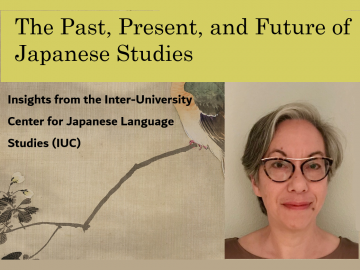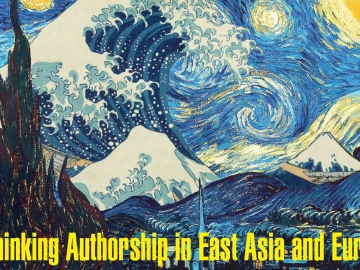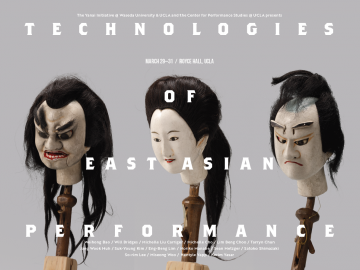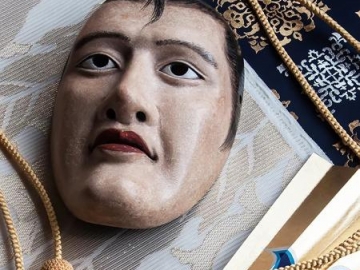On July 6, 2022, Dr. Indra Levy, Visiting Associate Professor at our university, gave a lecture entitled “The Past, Present, and Future of Japanese Studies: Insights from the Inter-University Center for Japanese Language Studies (IUC)” in Conference Room 1 on Toyama Campus. Levy specializes in modern and contemporary Japanese literature, teaches at Stanford University as Associate Professor, and serves as Executive Director of the Inter-University Center for Japanese Language Studies (IUC).
In April of this year, she received the inaugural Irene Hirano Inouye Memorial Award at UCLA’s Terasaki Center for Japanese Studies in recognition of her academic achievements as a scholar of Japanese literature and her contributions as Executive Director for the IUC. The Irene Hirano Inouye Memorial Award is given to persons who have contributed to the development of U.S.-Japan relations in areas such as academia, business. creative arts, international relations, medicine and science. This lecture was organized by Professor Hirokazu Toeda, the project leader of International Japanese Studies and Director of the Waseda International House of Literature, to commemorate her award and to review the past, present, and future prospects of Japanese Studies at IUC. The lecture was held simultaneously in person and via Zoom webinar.
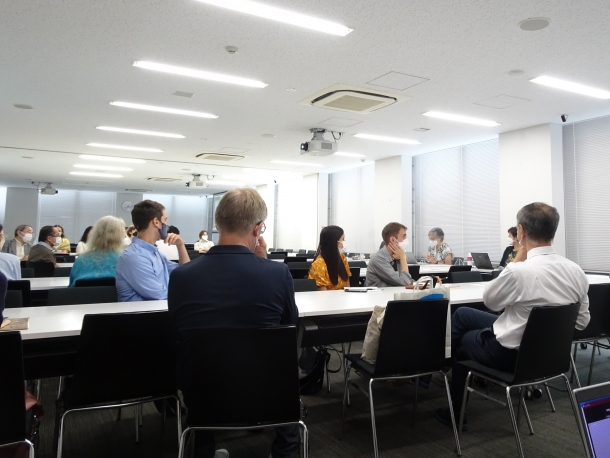
Levy began her talk by describing her own experience of studying Japanese language as an undergraduate and then moving on to the study of Japanese literature. She joined IUC as executive director in 2010, and said that her administrative duties at IUC led her to broaden her interests beyond the humanities to include the social sciences and Japanese studies in general.
IUC is an advanced Japanese language training institute operated by a consortium of 15 North American universities, including Stanford University, where Dr. Levy works. IUC offers immersive advanced Japanese language instruction for graduate students or university graduates who wish to pursue a career in Japan-related fields. It is characterized by its specialized Japanese language offerings in literature, history, cultural anthropology, introduction to Japanese studies, law, and business, and is currently located at Pacifico Yokohama in Minatomirai, Nishi-ku, Yokohama City.
The history of IUC is inseparable from the history of Japanese studies in North America. IUC’s predecessor was the Stanford Center for Japanese Studies, which opened in Tokyo in April 1961. The Center was opened with the cooperation of leading Japanese universities, including Waseda University, to encourage undergraduate and graduate students to pursue advanced Japanese studies for the purpose of promoting friendly relations between Japan and the United States. Two years after its opening, the Center switched to a system of joint management by a coalition of universities and changed its name to the current Inter-University Center for Japanese Language Studies (IUC). Today, the number of member institutions has grown from 10 to 15, and approximately three times as many students are enrolled at IUC as when the school first opened. Levy said that many IUC graduates are teaching at universities in North America, and the cycle is maintained as they recommend IUC to their students.
Despite this growth, IUC has not always had an easy road. Less than 10 years after its opening, IUC faced financial difficulties that threatened to close its doors, and it suffered from similar threats many times after that. When Levy took a position at Stanford University in 2004, she saw firsthand through her students the results of IUC’s Japanese language education, but at the same time she frequently heard that the center was on the verge of extinction due to financial difficulties. She felt that the loss of IUC would be a great loss for Japanese studies in North America, so she volunteered to become the Executive Director in order to try to solve this problem. She has been involved in the management of IUC for 12 years since her appointment in 2010 to the present.
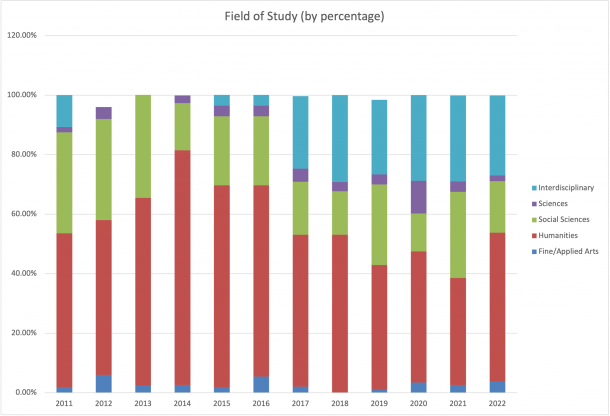
Levy then talked about how IUC has overcome the various difficulties encountered in the years since her appointment. First, she recounted her first-year experience of receiving a letter from a major donor on her first day in office. It stated that if she did not raise $2 million by the end of the school year, all previous support would be cut off. She immediately focused her efforts on fundraising. A few months later, the Great East Japan Earthquake struck on March 11, 2011, and Levy had to spend sleepless nights making sure IUC faculty and students were safe. Although the earthquake made face-to-face classes difficult IUC teachers made an immediate transition to online teaching that enabled all IUC students to complete the language program by the end of the semester. She also noted that the unprecedented appreciation of the yen after the disaster increased the actual cost of operating the center and placed a heavy financial burden on the center. In the midst of these challenges, Levy began to reform the business model. The longstanding approach to fundraising had focused on operational costs for the IUC. She shifted the focus of fundraising to support for students by increasing tuition costs and actively seeking scholarship support. She said that reorienting the focus from the institution to the students it supports was key to resolving IUC’s longstanding financial difficulties.
Finally, Levy showed statistical data on IUC students’ areas of specialization and shared her perspective on the future of Japanese studies, showing how students’ interests have changed over the past several years. One of the most noticeable changes is that the previous overwhelming interest in the humanities has shifted around 2017 toward interdisciplinarity, or research across two or more disciplines beyond the traditional fields of study (See figure below, adapted from lecture material). Since the end of the Cold War, the number of scholars engaged in Japanese studies has been gradually decreasing, a trend that is particularly noticeable in political science and classical studies. Meanwhile, the areas of interest of students of Japanese studies have become more diverse, said Levy. Such areas include pop culture, manga, anime, design, disaster management, food culture studies, disability studies, environmental science, and public health.
Levy also said, “Finding creative ways to attract students with diverse interests to Japanese studies will become increasingly important for the growth of Japanese studies, and as part of this process, it is effective to structure classes in a way that evokes the interests of students in a flexible manner, without being limited to traditional areas of specialization.” As a practical example of an attempt at such cross-disciplinary education, she introduced the class “Japanese Functional Objects” taught by Ariel Stilerman, an IUC alumnus and currently assistant professor at Stanford University. This class (featured in the Stanford University News) was conducted in collaboration with faculty in mechanical engineering and physics with the aim of questioning the boundary between art and utility through the use of Japanese tools with various functions.
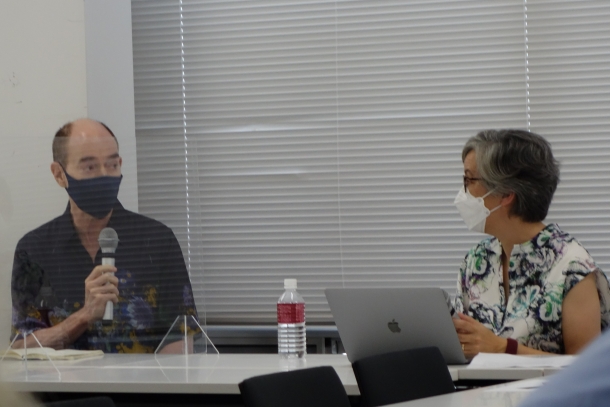
The lecture was followed by a conversation between Levy and Robert Campbell, University Professor of Waseda University and Advisor to the Waseda International House of Literature. Campbell is also a graduate of IUC, where he studied from 1979-80. Reflecting on his own experience of receiving intensive Japanese language education at IUC, Campbell discussed with Levy the American cultural policies surrounding foreign language education behind the process of the center’s creation in the early 1960s and its development into a consortium. Campbell also introduced Levy’s book, Siren of the Western Shore, and asked her about her thoughts on her current involvement in the management of an educational institution, which is seemingly separate from her research. In response, Levy stated that her passion for the Japanese language was the starting point for both her literary research and her work for IUC.
In the Q&A session, questions and answers were exchanged about whether IUC’s intensive Japanese language education methods can be applied to foreign language education in general, and how IUC utilizes its database of graduates. One question came from Glen S. Fukushima, currently a member of the IUC leadership board and Specially Appointed Professor of Waseda University, about what efforts are needed to revitalize Japanese studies in the United States. Levy responded by expressing her own thoughts on the need for financial support for the field of Japanese studies and university-allied endowment grants, and how IUC’s prestige could help in this regard.
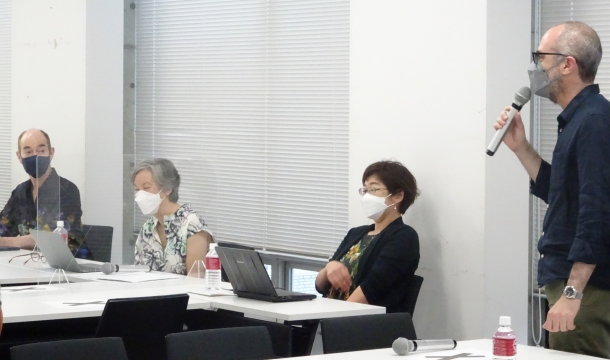
最後に、David Lurie, Associate Professor at Columbia University, concluded the lecture with closing remarks.
Event details
- Date and time: Wednesday, July 6, 2022, 16:30 – 18:00 (JST)
- Venue: Waseda University, Toyama Campus, Building 33, 3F Conference Room 1
*In-person attendance is limited to Waseda University faculty, students and staff - Lecturer: Dr. Indra Levy
- Language: Japanese, and English and Japanese for Q&A session
- Free of charge
- Open to the public through Zoom
- Organized by: The Global Japanese Studies Model Unit, Waseda University Top Global University Project
Co-organized by: The Waseda International House of Literature (The Haruki Murakami Library), Japanese Culture of Research Institute for Letters, Arts and Sciences, The Ryusaku Tsunoda Center of Japanese Culture
Cooperation: The Yanai Initiative for Globalizing Japanese Humanities
Abstract
The Past, Present, and Future of Japanese Studies: Insights from the Inter-University Center for Japanese Language Studies (IUC)
Founded in Tokyo in 1963, the IUC is an immersion program in advanced Japanese language. Currently located in Yokohama, the IUC is operated by a consortium of North American universities with major programs in Japanese studies. Throughout its long history, the IUC has trained hundreds of Japanese studies scholars and experts. The IUC has also faced many challenges that threatened to end the program. How did it manage to survive, and what can we learn from its history?
Trained as a specialist in Japanese literature, IUC Executive Director Indra Levy came to understand the broader field of Japanese studies through her work for the IUC. For this talk, Levy will explain how she mobilized the critical relationship between the IUC, its students, and its alumni to ensure that this unique institution would not only survive but also thrive in the 21st century.
Dr. Indra Levy has recently been awarded the first Irene Hirano Inouye award by the Terasaki Center for Japanese Studies, honoring her contributions to the field of Japanese studies as leader of the Inter-University Center for Japanese Language Studies, and as a scholar and mentor.
